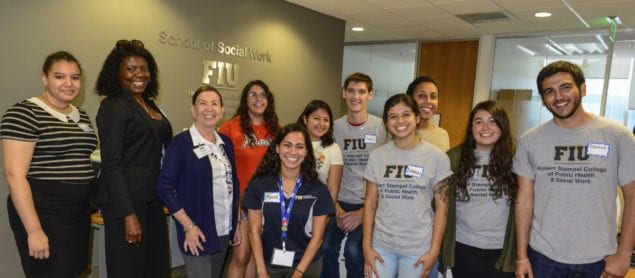The School of Social Work, part of the Robert Stempel College of Public Health & Social Work, has been selected out of more than 100 universities nationwide to participate in The National Council for Behavioral Health’s learning collaborative on the opioid epidemic.
Opioid use has been a health crisis in the United States since the use of prescription opioids, heroin, and the synthetic opioid substitute fentanyl reached epidemic proportions over the past couple of decades. While the Centers for Disease Control and Prevention (CDC) announced a decline in overdose-related deaths this year, there are still more than 2 million individuals who are estimated to have a substance use disorder related to opioids and an estimated 130 Americans die every day from an opioid overdose.
“Social workers are critical players on the front lines of the opioid epidemic,” said Jennifer Abeloff, associate director of the School of Social Work. “We are the counselors, therapists, and case managers who work with individuals impacted as well as their families and communities.”
The Social Workers on the Front Lines of the Opioid Epidemic Learning Collaborative is designed to enhance social workers’ skills in the field when dealing with the many-faceted approach to working with individuals and communities who are dealing with the opioid crisis.
“Our involvement with the opioid learning collaboration will further enhance the specialized addictions training and certification we offer our Master of Social Work students, who will graduate with the skills needed to combat the opioid epidemic and its consequences for individuals, families and communities in South Florida,” said Eric Wagner, professor in the School of Social Work and director of FIU’s Community-Based Research Institute.
Ten universities throughout the country were selected to participate in the project. The 20-month learning collaborative will begin by supporting each university as they refine or expand current course work related to addiction.
“Right now, The School of Social Work offers a 30-credit Graduate Certificate in Addictions, which includes three addictions electives,” Abeloff said. “It meets all the classroom educational requirements laid out by the State of Florida for certification through the Florida Certification Board and provides a springboard that takes this certificate to the next level, ensuring our graduates stay ahead of the curve.”
The collaborative also will assist the school in enhancing substance abuse curriculum for undergraduate social work majors.
Additionally, the program will collaborate with field placement sites that offer addiction-related services to assist in placing students in internships.
“Most importantly, this is a great opportunity for our students as the program will give seven to eight of our students the opportunity to learn techniques as they are developed and implement them in the communities that need them the most,” concluded Abeloff.
For this learning collaborative, The National Council for Behavioral Health is working in partnership with New York Community Trust and the Council on Social Work Education (CSWE).






